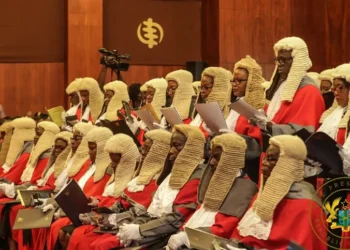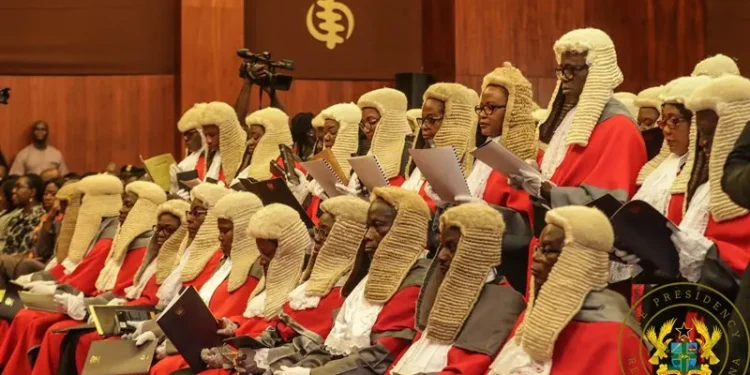In a significant move aimed at transforming Ghana’s road infrastructure, the Parliament of Ghana has passed a bill establishing the National Roads Authority (NRA).
This decision followed a motion moved by the Minister for Roads and Highways, Hon. Francis Asenso-Boakye, during the third reading of the National Roads Authority Bill. This new authority is poised to streamline the management of the country’s roads, addressing several long-standing issues that have plagued the sector.
“The primary objective of this Bill is to establish the National Roads Authority, an autonomous body responsible for planning, developing, maintaining, and managing Ghana’s national road network.”
Hon. Francis Asenso-Boakye, Minister for Roads and Highways
The NRA will unify the functions of three key agencies currently operating under the Ministry of Roads and Highways: the Ghana Highway Authority, the Department of Urban Roads, and the Department of Feeder Roads.
This consolidation is expected to enhance efficiency by reducing bureaucratic redundancies and improving coordination among these bodies.
The jurisdiction of the NRA will encompass various categories of roads, including trunk roads, arterial roads, collector roads, and district and inter-district roads. This comprehensive oversight is intended to ensure consistent standards and maintenance practices across all types of roads in the country, fostering a more integrated and effective road management system.
The establishment of the NRA is rooted in the recognition of several critical challenges within the existing road sector framework. Last year, the Cabinet approved the creation of the NRA to tackle issues such as lack of coordination, duplicated efforts, insufficient maintenance, inconsistent standards, and project delays.
These problems have adversely affected the quality, safety, and sustainability of the road network, thereby impeding economic growth and social development.
In his address to Parliament, Hon. Asenso-Boakye emphasized the importance of the NRA in overcoming these challenges.
“The establishment of the National Roads Authority is vital for the achievement of a well-planned, well-maintained, and safe road network in Ghana,” he said.
Hon. Francis Asenso-Boakye, Minister for Roads and Highways
The Minister’s remarks underscore the government’s commitment to enhancing the infrastructure necessary for the country’s development.
NRA Streamlines Road Management, Boosts Economic Growth

By consolidating the responsibilities of the Ghana Highway Authority, the Department of Urban Roads, and the Department of Feeder Roads, the NRA will facilitate better coordination of road management activities. This will help avoid overlaps and ensure that all efforts are aligned towards common goals.
“The new authority will streamline processes, reduce administrative overhead, and eliminate redundant tasks, leading to more efficient use of resources. This efficiency is expected to translate into faster project completion times and better utilization of public funds.”
Hon. Francis Asenso-Boakye, Minister for Roads and Highways
Hon. Asenso-Boakye highlighted that the NRA will enforce uniform standards for road construction, maintenance, and safety across the country. This consistency is crucial for ensuring that all roads, regardless of their location or classification, meet the same high-quality benchmarks.
Hon. Asenso-Boakye further noted that a well-maintained road network is essential for economic activities, facilitating the movement of goods and people. Improved road infrastructure will support trade, boost local economies, and attract investment, thereby contributing to overall economic growth.
“Better roads enhance connectivity between communities, improving access to essential services such as healthcare, education, and markets. This connectivity is vital for the social and economic development of rural and urban areas alike.”
Hon. Francis Asenso-Boakye, Minister for Roads and Highways
With the bill now passed, the next steps involve the formal establishment of the NRA and the transition of responsibilities from the existing agencies to the new authority. This process will require careful planning and coordination to ensure a smooth transition and minimize disruptions to ongoing projects and services.
The government is expected to outline a detailed implementation plan, including timelines, resource allocation, and stakeholder engagement strategies. Effective communication and collaboration with all relevant parties will be crucial to the successful operationalization of the NRA.
The passing of the National Roads Authority Bill marks a pivotal moment in Ghana’s journey towards a modern and efficient road infrastructure system. By addressing the systemic challenges that have hindered progress in the past, the NRA is set to play a critical role in building a road network that meets the needs of a growing and dynamic nation.
READ ALSO: Ghana’s 2023 Exports to EU Rises by 8% While Imports Decline























